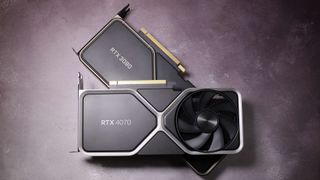Well, that didn't take long: FSR 3 mod released that replaces DLSS 3 frame gen in any game
It's not perfect but pretty much anyone can now enjoy a handy frame rate boost.
Less than a week ago, AMD released the full source code for its FSR 3 generation technology, and one of the first mods to utilise it has been released. This one is a bit special, though, as it can be used to replace DLSS 3 Frame Generation in any game that uses Nvidia's system. It's not a perfect conversion but it does allow all GeForce RTX owners, not just those with RTX 40-series GPUs, to enjoy a frame rate boost.
It was less than a week ago when I reported on AMD's announcement that the source code and full software development kit for its FidelityFX Super Resolution 3 system was available for anyone to freely use and tinker about with. It was clear that modders would jump on this immediately to bring FSR 3 to as many games as possible, but I have to say that I was somewhat surprised by how quickly this has happened.
Especially in the case of the mod by Github user Nukem9 (via Wccftech). If you have a game that offers DLSS 3 Frame Generation as an option, you can use this mod to replace that system with AMD's frame interpolation tech in FSR 3. Unlike previous mods, this one should work in any game that uses Nvidia's method.
Take Cyberpunk 2077 as an example: Frame generation is only available to gamers using a GeForce RTX 40-series graphics card because the game uses DLSS 3. Well, all you have to do is download the mod (click here for the zip file) and extract the archive into the same folder that the game's main execute (.exe) file is located.
Next, make sure you have Hardware Accelerated GPU Scheduling enabled in Windows. To do this, click through Start Menu > Settings > System > Display > Graphics. In Windows 10, you should see the option to enable it at the top of the menu, whereas in Windows 11, you'll need to click on the Default graphics settings option to see the toggle.

Then, it's simply a case of firing up the game, heading over to the graphics settings, and then enabling DLSS Frame Generation. Except the game won't use that, instead it will run with the FSR 3 mod. You can see how it all looks in action in this YouTube video from MxBenchmarkPC, which shows an RTX 3080 being used to compare Cyberpunk 2077 when using FSR 2.2 against DLSS upscaling, and then with the frame generation mod enabled.

Best CPU for gaming: The top chips from Intel and AMD.
Best gaming motherboard: The right boards.
Best graphics card: Your perfect pixel-pusher awaits.
Best SSD for gaming: Get into the game ahead of the rest.
The boost to the frame rate is patently clear, although there does seem to be an odd visual glitch or two. That's to be expected, of course, as the game's code was written with DLSS 3 in mind and it has different rendering requirements to FSR 3.
The biggest gaming news, reviews and hardware deals
Keep up to date with the most important stories and the best deals, as picked by the PC Gamer team.
But if that sort of thing doesn't bother you and your GPU isn't one of Nvidia's Ada Lovelace models, then this is the ideal way to get a spot of free performance.
Naturally, a native implementation of AMD's frame generation technology is always going to be better but since so few games offer it at the moment, you pretty much have to go down the modding route if you want to use it.
Now that the FSR 3 SDK is publicly available, we should hopefully see a lot more games in 2024 offer the feature. And if they don't and go down the Nvidia route, well the modding community clearly has your back.

Nick, gaming, and computers all first met in 1981, with the love affair starting on a Sinclair ZX81 in kit form and a book on ZX Basic. He ended up becoming a physics and IT teacher, but by the late 1990s decided it was time to cut his teeth writing for a long defunct UK tech site. He went on to do the same at Madonion, helping to write the help files for 3DMark and PCMark. After a short stint working at Beyond3D.com, Nick joined Futuremark (MadOnion rebranded) full-time, as editor-in-chief for its gaming and hardware section, YouGamers. After the site shutdown, he became an engineering and computing lecturer for many years, but missed the writing bug. Cue four years at TechSpot.com and over 100 long articles on anything and everything. He freely admits to being far too obsessed with GPUs and open world grindy RPGs, but who isn't these days?
Most Popular






